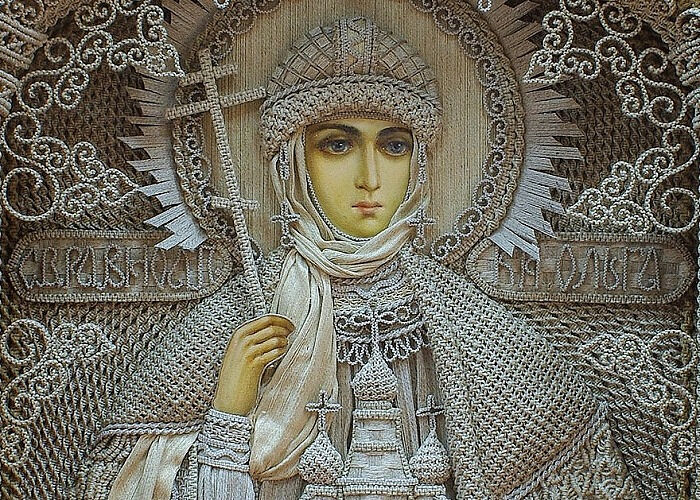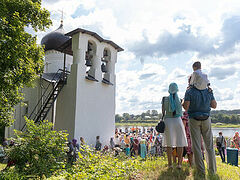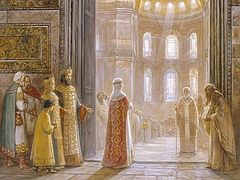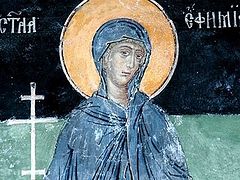On July 24, the Church honors the memory of the holy Equal-to-the-Apostles Princess Olga. We offer our readers a theological-philological commentary on the troparion and kontakion of this feast.
The Equal-to-the-Apostles Olga, the grandmother of the baptizer of the Russian land, the holy Equal-to-the-Apostles Prince Vladimir, is an important person in the spread of Orthodoxy in Rus’. Her Baptism in 957 was marked by the prophetic words of Patriarch Theophylact, who baptized her:
Blessed art thou among Russian women, for thou hast abandoned the darkness and loved the Light. The sons of Russia will glorify thee unto their last generation!1
Princess Olga received in Baptism the name of the holy Equal-to-the-Apostles Helen (which translates from ancient Greek as “torch”), the mother of the Roman Emperor Constantine I, who found the Life-giving Cross of the Lord in Jerusalem in 326 and did much for the development of Christianity in the Roman Empire.
The whole hagiography of Princess Olga is imbued with the great wisdom that guided her throughout her life. Her first encounter with her future husband, Prince Igor of Kiev, her rule over Rus’ after his death, her adoption of Christianity, and many other moments of her life testify to this. St. Nestor the Chronicler narrates:
From an early age, Blessed Olga sought with wisdom that which is best in this world, and found the pearl of great price—Christ.2
Orthodox Christians can touch the history of the saints who lived hundreds of years ago through the Divine services, which includes hymnographic texts dedicated to a particular saint or feast.
In particular, the troparion to the Equal-to-the-Apostles Princess Olga describes the specifics of her spiritual feat, tells about the brightest events from her life, and glorifies her holiness and life in a concise form; the kontakion focuses on the prayerful glorification of the saint.
These hymns read:
Troparion:
Having furnished thy mind with wings of Divine knowledge, thou didst soar far above visible creation; and seeking God, the Creator of all, and finding Him, thou didst receive rebirth through Baptism; and delighting in the Tree of Life, O ever-glorious Olga, thou remainest incorrupt forever.
Kontakion:
Let us hymn today God the Benefactor of all, Who glorified the divinely wise Olga in Russia, that through her supplications He might grant remission of sins to our souls.
Wings of Divine knowledge
From the first words, the emphasis is on the most important goal in a man’s life—Divine knowledge: “Having furnished thy mind with wings of Divine knowledge.”
The image of wings is important for Orthodox hymnography. It’s based on the Psalms of King David: Keep me as the apple of the eye, hide me under the shadow of Thy wings (Ps. 16:8). And St. John Climacus writes: “Faith gives wing to prayer, and without faith, prayer cannot ascend to Heaven.”3 Having furnished her mind with the wings of faith and Divine knowledge, St. Olga yearned for the most important thing in life—God.
The desire for God can be manifested or realized only by His self-revelation to man. Orthodox dogmatic theology distinguishes between the concepts of natural and supernatural knowledge of God.
Natural revelation is taught by God Himself and is perceived by man in a natural way, by studying the world, the course of history, and personal experience. But supernatural knowledge of God is completely different. It’s possible only in the personal experience of the spiritual life.
St. Olga perceived natural knowledge of God thanks to the great wisdom she showed throughout her entire life, protecting and strengthening the Russian people and nourishing the sprouts of the Orthodox faith. At the end of her life, Princess Olga testified to this with her final words to her son Prince Svyatoslav Igorevich, which reverberated into eternity:
God’s will be done; if God so desires to have mercy upon my family and the Russian land, then He will place in their hearts that same desire to turn to God that He granted me.4
And St. Olga was vouchsafed to receive supernatural knowledge of God during her lifetime. As Patriarch Theophylact prophesied about her, St. Olga came to love the Light—the Lord Jesus Christ.
Above visible creation
In the troparion, St. Olga is hymned with the words: “Thou didst soar far above visible creation; and seeking God, the Creator of all.”
With the phrase, “soar far above,” the author shows the greatness of St. Olga’s desire for Divine knowledge and indicates that she not only soared upwards, but far above, that is, she soared to the utmost heights.
The author doesn’t stop there, but adds that the search for God is a never-ending process. Having attained the highest degree of created existence, St. Olga, like all the saints, continues upon the path of infinite Divine knowledge.
Rebirth through Baptism
The Equal-to-the-Apostles was called to seek God. In her desire for the Creator of all, gradually coming to know herself, Princess Olga found Him in the Sacrament of Baptism.
And she finds Him—the One she has sought for so long, and then proceeds to the Sacrament of Baptism. Baptism is the first Sacrament for a Christian, since it’s the “birth and foundation of our new life in Christ.”5
Princess Olga had to accept the Sacrament of Baptism, because without it she wouldn’t have been able to continue her search for truth. Without Baptism, it’s impossible to become part of the Body of Christ—the Church, or to participate in the other Sacraments. The Lord Himself points out the necessity and saving power of Baptism: He that believeth and is baptized shall be saved (Mk. 16:16); Except a man be born of water and of the Spirit, he cannot enter into the Kingdom of God (Jn. 3:5).
Delighting in the Tree of Life
There’s a reason why the troparion gives special attention to the Tree of Life—the Lord’s Cross. The Equal-to-the-Apostles Queen Helen, whose name Princess Olga received in Baptism, discovered the Life-giving Cross of the Lord in Jerusalem near Golgotha in 326. Patriarch Theophylact of Constantinople, who baptized Princess Olga in 957, blessed the newly-baptized with the Cross.
In the Orthodox Tradition, the Precious and Life-giving Cross upon which the Lord was crucified is commonly called Life-bearing, that is, it bears life within itself. The Church not only calls the Cross life-bearing, but also honors it as the antitype of the paradisiacal Tree of Life. The Cross opens closed Paradise and ushers in the Wise Thief who came to believe in the Savior. Every man has this possibility since the death of Jesus Christ upon the Cross and His Bright Resurrection.
The troparion ends with the phrase: “O ever-glorious Olga, thou remainest incorrupt forever.” Incorruption is the opposite of corruption. Corruption is man’s susceptibility to such passionate states as thirst, hunger, physical fatigue, and pain. The state of incorruption, in which man experiences no physical fatigue, pain, hunger, or thirst, is attained in the Heavenly Kingdom.
St. Olga is called “ever-glorious”—that is, worthy of eternal glorification. She remains incorruptible in the Kingdom of Heaven forever.
God the Benefactor of all
The rather short but very meaningful kontakion to the Equal-to-the-Apostles Olga begins with the traditional call to hymn God: “Let us hymn today God the Benefactor of all.”
Hymns and ecclesiastical songs of praise—all of this is prayer. This is precisely how through petitions of praise, supplication, or thanksgiving, a man turns to God for help; and if that which is entreated from God is good for man, the Lord will grant all that is necessary and useful for man’s salvation.
The central place in the kontakion, as in the troparion, is given to Divine knowledge—that very wisdom in God, the knowledge of God that St. Olga sought for and manifested throughout her life.
The kontakion concludes with a traditional prayer entreating remission of sins by the prayers of the holy Equal-to-the-Apostles Princess Olga, who stands and prays for the entire Russian land before the throne of God: “Through her supplications He might grant remission of sins to our souls.”
***
The troparion and kontakion to St. Olga turn our attention to the most important thing in the life of man—the knowledge of God—and calls everyone, having furnished their minds with wings of Divine knowledge, to soar far above visible creation, seeking God the Creator of all.




